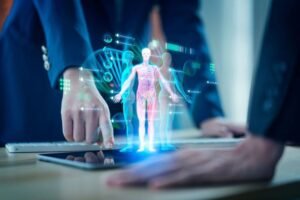Artificial Intelligence (AI) is revolutionizing the healthcare sector, especially in diagnostics. Through the use of sophisticated algorithms and machine learning, AI-based diagnostic systems are able to process medical information rapidly and with high precision, enhancing patient outcomes and the effectiveness of healthcare systems. Here’s an in-depth look at how AI is transforming diagnostics in healthcare:

1.AI in Imaging and Radiology
AI has also demonstrated great potential in the area of medical imaging. Through deep learning models, AI systems are able to interpret medical images like X-rays, MRIs, and CT scans, identifying abnormalities such as tumors, fractures, and infections. Such systems can help radiologists by pointing out potential problems that could be overlooked, allowing for quicker and more precise diagnoses. For example, AI is already assisting in detecting early-stage cancers, especially in breast and lung imaging.
-Example: Google’s DeepMind created an AI system that beat human radiologists at detecting breast cancer from mammograms, providing quicker and more accurate results.
2. AI in Pathology
In pathology, AI is applied to examine tissue samples and biopsy reports. AI models can read slides at a microscopic level, identifying abnormalities like cancer cells or bacteria. The models apply pattern recognition to comprehend intricate cell structures and recognize possible diseases.
– Example: PathAI has created AI-based tools that help pathologists diagnose diseases such as cancer, enhancing accuracy and efficiency. 3. Predictive Diagnostics
Artificial intelligence (AI) can also forecast the probability of contracting specific diseases, on the basis of a patient’s medical history, gene information, and lifestyle. By working with vast amounts of data from electronic health records (EHRs), AI algorithms can detect early warning signs of illnesses like cardiovascular disease, diabetes, or neurological disorders years before symptoms arise.
– Example: IBM Watson Health applies AI to review patient records and forecast the risk of diseases such as heart disease, giving clinicians insights to prevent or manage them in advance.
4. Personalized Medicine
AI-based diagnostics can also play an important part in personalized medicine, where the treatment and intervention are adapted according to the individual’s genetic information. By examining genetic information, AI can predict the reaction of a patient to specific medicines, thereby preventing ineffective treatments or adverse side effects.
– Example:AI systems are utilized in oncology to suggest customized cancer treatment protocols based on the genomic information of the patient and the type of cancer.

5. Clinical Decision Support
AI can function as a decision support tool within clinical practice to guide physicians’ decision-making processes. Using patient data to examine, AI models can put forward possible diagnoses, propose therapy protocols, and even alert providers to significant developments in a patient’s condition. This functionality aids in optimizing decision-making with the latest, most pertinent data available at providers’ fingertips.
– Example:Artificial intelligence systems such as Aidoc help radiologists detect life-threatening conditions like brain hemorrhages, leading to instant intervention.
6. Natural Language Processing (NLP) in Diagnostics
AI employs Natural Language Processing (NLP) to analyze and interpret unstructured clinical note data, medical literature, and patient interactions. NLP assists in extracting meaningful information from patient records, improving the diagnostic process by detecting relevant patterns or symptoms that are not necessarily apparent.
– Example: Nuance’s Dragon Medical, an AI-powered speech recognition software, assists physicians in dictating clinical notes rapidly, streamlining diagnosis.
7. Remote Diagnostics and Telemedicine using AI
Telemedicine has picked up steam immensely, particularly in remote locations where medical professionals are not available nearby. With AI-powered diagnostic equipment, physicians are able to diagnose patients remotely by going through images, videos, and other diagnostic information received on telehealth platforms. Healthcare becomes more available and prompt, especially in case of emergencies or when patients cannot easily move around.

– Example: Artificial intelligence-based apps such as Babylon Health enable patients to explain their symptoms through chat or video, and the system returns instant preliminary diagnoses or recommendations, assisting in early detection of illnesses.
8. Challenges and Considerations
While diagnostics with AI have tremendous potential, it also presents challenges:
– Data Privacy:Processing sensitive patient information demands compliance with strict privacy laws (e.g., HIPAA) and the adoption of strong data protection practices.
– Bias and Accuracy: AI models rely on high-quality, diverse training datasets. Data bias can result in inaccurate or unfair healthcare outcomes.
– Adoption and Trust:The deployment of AI in medicine necessitates trust by medical practitioners and patients. Transparancy and training are needed to ensure the AI systems and tools are recognized as trusted and useful.
9.The Future of AI Diagnostics
The future of AI-based diagnostics is very promising. With the advancement of AI technology, we can anticipate even more accurate and quicker diagnostic tools, which can be easily integrated into healthcare workflows. Moreover, the ongoing development of AI in personalized medicine will result in more targeted, individualized treatments, enhancing the quality of care overall.
In summary, AI-based diagnostics are revolutionizing the healthcare sector by delivering more precise, timely, and personalized diagnoses. Although there are hurdles to be crossed, the potential of AI in improving patient care and optimizing healthcare processes is vast. As technology continues to advance, the future of AI in diagnostics will only expand, fueling innovations that enhance health outcomes globally.





